Related Research Articles

Chicano or Chicana is an ethnic identity for Mexican Americans that emerged from the Chicano Movement. Chicano was originally a classist and racist slur used toward low-income Mexicans that was reclaimed in the 1940s among youth who belonged to the Pachuco and Pachuca subculture.
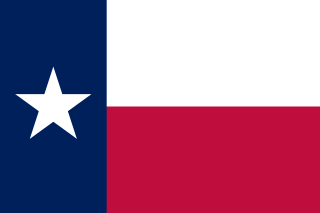
Tejanos are descendants of Texas Creoles and Mestizos who settled in Texas before its admission as an American state. The term is also sometimes applied to Texans of Mexican descent.
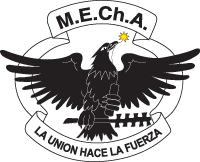
M.E.Ch.A. is a US-based organization that seeks to promote Chicano unity and empowerment through political action.

The Chicano Moratorium, formally known as the National Chicano Moratorium Committee Against The Vietnam War, was a movement of Chicano anti-war activists that built a broad-based coalition of Mexican-American groups to organize opposition to the Vietnam War. Led by activists from local colleges and members of the Brown Berets, a group with roots in the high school student movement that staged walkouts in 1968, the coalition peaked with an August 29, 1970 march in East Los Angeles that drew 30,000 demonstrators. The march was described by scholar Lorena Oropeza as "one of the largest assemblages of Mexican Americans ever." It was the largest anti-war action taken by any single ethnic group in the USA. It was second in size only to the massive U.S. immigration reform protests of 2006.

The Brown Berets is a pro-Chicano paramilitary organization that emerged during the Chicano Movement in the late 1960s. David Sanchez and Carlos Montes co-founded the group modeled after the Black Panther Party. The Brown Berets was part of the Third World Liberation Front. It worked for educational reform, farmworkers' rights, and against police brutality and the Vietnam War. It also sought to separate the American Southwest from the control of the United States government.
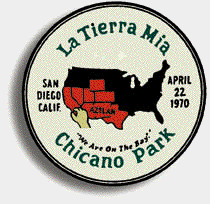
Chicano Park is a 32,000 square meter park located beneath the San Diego–Coronado Bridge in Barrio Logan, a predominantly Chicano or Mexican American and Mexican-migrant community in central San Diego, California. The park is home to the country's largest collection of outdoor murals, as well as various sculptures, earthworks, and an architectural piece dedicated to the cultural heritage of the community.

Fernando Luján was a Mexican actor. He was a star of the silver screen in classic mexican films during the Golden Age of Mexican cinema.
José Angel Gutiérrez, is an attorney and professor at the University of Texas at Arlington in the United States. He was a founding member of the Mexican American Youth Organization (MAYO) in San Antonio in 1967, and a founding member and past president of the Raza Unida Party, a Mexican-American third party movement that supported candidates for elective office in Texas, California, and other areas of the Southwestern and Midwestern United States.
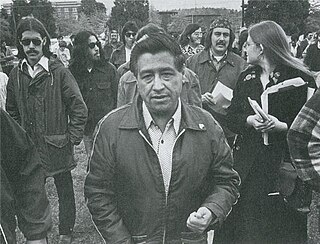
The Chicano Movement, also referred to as El Movimiento, was a social and political movement in the United States that worked to embrace a Chicano/a identity and worldview that combated structural racism, encouraged cultural revitalization, and achieved community empowerment by rejecting assimilation. Chicanos also expressed solidarity and defined their culture through the development of Chicano art during El Movimiento, and stood firm in preserving their religion.

The Centro Cultural de la Raza is a non-profit organization with the specific mission to create, preserve, promote and educate about Chicano, Mexicano, Native American and Latino art and culture. It is located in Balboa Park in San Diego, California. The cultural center supports and encourages the creative expression “of the indigenous cultures of the Americas.” It is currently a member of the American Alliance of Museums.

Partido Nacional de La Raza Unida was a Hispanic political party centered on Chicano (Mexican-American) nationalism. It was created in 1970 and became prominent throughout Texas and Southern California. It was started to combat growing inequality and dissatisfaction with the Democratic Party that was typically supported by Mexican-American voters. After its establishment in Texas, the party launched electoral campaigns in Colorado, Arizona, New Mexico, and California, though it only secured official party status for statewide races in Texas. It did poorly in the 1978 Texas elections and dissolved when leaders and members dropped out.
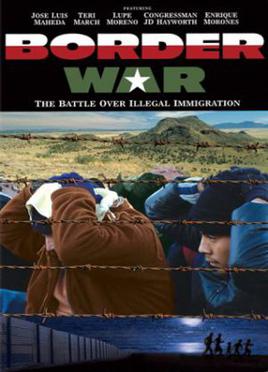
Border War: The Battle Over Illegal Immigration is a 2006 documentary film, written, produced and directed by Kevin Knoblock. The film tells the stories of five people whose lives have been affected by illegal immigration along the U.S.-Mexico border. They are J.D. Hayworth, a Republican congressman from Arizona, Teri March, widow of Los Angeles County Sheriff's Deputy David March, who was murdered by an illegal immigrant in 2002, U.S. Border Patrol agent Jose Maheda, Border Angels founder and activist for undocumented migrants Enrique Morones, and Lupe Moreno, a female Hispanic member of the Minuteman Project.

Luis Alberto Urrea is a Mexican-American poet, novelist, and essayist.
Border Angels is a San Diego-based 501(c)(3) tax-exempt nonprofit charitable organization that is focused on migrant rights, immigration reform, and the prevention of immigrant deaths along the border. Border Angels, along with its more than 2000 volunteers serves San Diego County's immigrant population through various migrant outreach programs such as day laborer outreach and legal assistance, and provides life-saving assistance for migrants by placing bottled water in remote mountain and desert border regions of the San Diego and Imperial counties, California.
The following is a timeline of Latino civil rights in the United States.
Herman Baca is a Chicano activist best known for grassroots community organizing in National City, California. Mentored by labor activists Bert Corona and Soledad Alatorre, Baca focused on political empowerment, grassroots organizing, police brutality, immigration, and a number of other issues during his involvement with the Mexican American Political Association, La Raza Unida Political Party, CASA Justicia, and the Committee on Chicano Rights. He was a key figure that advocated for undocumented immigrants as a part of the "Chicano/Mexicano" community during the Chicano Civil Rights Movement since the 1960s. As part of the Chicano Movement, Baca advocated for self-determination and defending human rights through organizing protests, administering electoral registration campaigns, community-based fund raising through tardeadas, and legal defense and social service workshops. Baca is currently based in San Diego, California in San Diego County.

Tamara De Anda Prieto, also known by her pen name Plaqueta, is a Mexican blogger and journalist. She received international attention after an incident of harassment involving a taxi driver, and was subsequently the target of online harassment and trolls. She previously blogged for El Universal, and published the 2018 book #Amigadatecuenta, along with fellow activist Andrea Arsuaga. In 2017 she was named among BBC's 100 Women.
Martín Porferio "Marty" Serna was an early organizer of the Chicano Movement, who was one of the founders of the Brown Berets in Pueblo, Colorado. He was part of the La Raza Unida political party, and developed several community organizations in Pueblo including the Black/Brown Berets, United Farmworkers Organization, Escuela Huitzhualopán, Southern Colorado Chicano Planning Council, and El Partido de la Raza Unida.
Ricardo Falcón (1945–1972) was a Chicano activist with the United Mexican American Students and was the first martyr of the Chicano movement in Colorado.
Ramón "Chunky" Moroyoqui Sánchez was a Chicano musician, folklorist, and activist. During the Chicano Movement, he formed Los Alacranes Mojados, performed and organized for the United Farm Workers, and was a founder of Chicano Park.
References
- ↑ "House of Mexico". houseofmexico.org. Retrieved 2016-11-28.
- ↑ "Border Angels Complete 25 Years of Aiding Immigrants". Fox News Latino. November 21, 2011. Retrieved 28 June 2016.
- ↑ "Luis Morones, 93, headed Aeromexico in San Diego". San Diego Union Tribune.
- ↑ "Enrique Morones vive para abrir puertas o la frontera entre EEUU y México". The Washington Post. Retrieved 23 August 2024.
- ↑ Zirin, Dave. "Enrique Morones: The Man Who Would Move the Game". The Nation. Retrieved 28 June 2016.
- ↑ "Former Padres executive takes on 'missionary work'". National Catholic Reporter. Retrieved 23 August 2024.
- ↑ "Enrique Morones: The Man Who Would Move the Game". Edge of Sports. Retrieved 23 August 2024.
- ↑ "ENRIQUE MORONES - Border Angels". www.borderangels.org. Archived from the original on 2016-04-19.
- ↑ "Enrique Morones PhD".
- ↑ "Before Border Angels Founder Retired, Two Women Claimed Sexual Harassment". Press Reader.
- ↑ "For subscribers: Before Border Angels founder retired, two women alleged sexual harassment". Los Angeles Times. 2022-10-24. Retrieved 2024-06-13.
- ↑ "Buen Hombre Podcast". Buen Hombre.
- ↑ Stone, Chris (21 April 2020). "50th Anniversary of Chicano Park Day Marked by Enrique Morones Podcast". Times of San Diego. Retrieved 8 March 2023.